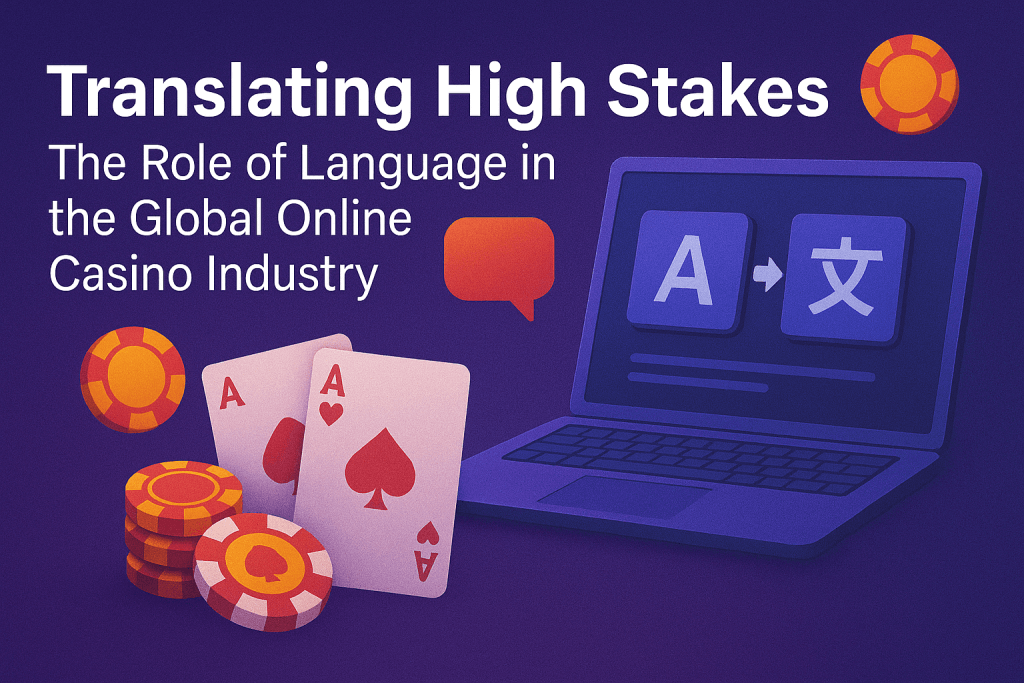As the global online gambling industry grows more competitive and diversified, language services have become an essential part of delivering seamless, compliant, and culturally relevant gaming experiences. Online casinos now attract players from dozens of countries, and the expectation for high-quality localization is at an all-time high. Translators play a pivotal role in ensuring that the thrill of online betting transcends language barriers without compromising clarity, legality, or user experience.
In this evolving sector, translation is not merely about converting text—it’s about adapting content, tone, and function to meet user expectations across multiple jurisdictions. For translation professionals, this niche presents both a challenge and an opportunity to contribute meaningfully to an expanding digital frontier.

The Importance of Localization in Online Gambling Platforms
Localization in the online gambling sector involves more than translating game interfaces. It includes adapting user onboarding processes, customer support, promotional materials, payment system descriptions, and legal disclaimers. Each element must be precisely tailored to local norms and expectations to establish trust and usability.
Poorly translated content can cause confusion at best and legal violations at worst. For example, discrepancies in translated terms related to wagering rules or payout conditions could be considered misleading in some jurisdictions. As a result, translators in this niche are often required to blend linguistic fluency with regulatory awareness and sector-specific terminology.
Trust, Discretion, and Language: The Translator’s Role
One of the most distinctive elements of the online casino world is its emphasis on privacy and user security. Many platforms prioritize discreet transactions and anonymous gameplay as a selling point. In this context, clarity and tone become especially critical in translation.
Take, for instance, a platform like casino-incognito.com, which emphasizes privacy-focused gaming for international users. A successful translation strategy for such a site must reflect that core value proposition in every language. Ambiguity or mistranslation in privacy policies or withdrawal terms could undermine user confidence. Translators must be attentive not only to word choice but to tone and perceived meaning.
Key Elements in Casino Content Translation
Online casinos typically feature a wide range of content types, each with unique translation requirements. The most common elements include:
- Game Descriptions: Slot machines, live table games, and card games often come with unique themes and narratives that require creative localization.
- Bonus Terms & Conditions: Precision is critical when translating promotional offers, as legal interpretations may vary widely across regions.
- Help Sections & FAQs: These must be adapted for clarity and tone, anticipating common user concerns in each target market.
- Payment Systems: Localized explanations for deposit and withdrawal methods, fees, and timelines are vital for user satisfaction.
- Live Dealer Chat Translation: Real-time translation and cultural etiquette play a significant role in delivering an engaging live casino experience.
Challenges in Translating Gambling Content
The online gambling industry presents several translation challenges, often compounded by legal and cultural nuances:
| Challenge | Description |
|---|---|
| Legal Compliance | Translation must comply with the gambling laws of each target country. |
| Technical Jargon | Use of betting terms and game mechanics require precise and consistent translation. |
| Regulatory Terminology | Jurisdiction-specific licensing and tax terms must be accurately reflected. |
| Player Slang & Idioms | Informal player language needs to feel authentic in the target language. |
| Censorship Sensitivities | Some cultures have restrictions or sensitivities around gambling content. |
Translators working in this space must frequently collaborate with legal advisors, localization managers, and technical teams to maintain content integrity while adjusting it for specific markets.
Tools and Strategies for Efficient Casino Localization
To manage scale and maintain consistency across markets, translators often rely on a combination of tools and strategies tailored to gambling content:
- Translation Memory (TM): Maintains consistency for frequently used phrases such as bonus types, wagering conditions, or regulatory notices.
- Glossaries: Essential for managing specific terminology like RTP (Return to Player), free spins, or progressive jackpots.
- Contextual Testing: Verifying translations within live or staging environments ensures UI/UX integrity and prevents formatting issues.
- Collaboration Platforms: Tools like Crowdin or Lokalise allow for streamlined workflows between translators, developers, and compliance teams.
Using these systems ensures that translation efforts are not only linguistically accurate but operationally aligned with live site functionality.
Ethical and Cultural Considerations in Gambling Translation
Beyond the technical, cultural sensitivity is vital. Gambling is regulated—or outright banned—in many regions, and attitudes toward it vary significantly by culture and religion. Translators must understand what content is acceptable, where disclaimers are required, and how gambling is framed in the local media and public discourse.
Moreover, some jurisdictions enforce strict responsible gambling requirements. Language that encourages excessive play or targets vulnerable groups can result in penalties. Translators must be careful to ensure that promotional messages remain compliant, balanced, and non-exploitative.
The Future of Translation in the Gambling Industry
As new technologies—like virtual reality casinos, blockchain gaming, and AI-driven gambling—enter the mainstream, the role of translators will continue to evolve. These innovations will introduce new terminology, interaction models, and user expectations that demand even more nuanced and forward-thinking translation work.
Simultaneously, the globalization of gambling platforms means more languages, more markets, and more regulatory frameworks to address. The intersection of translation, law, marketing, and UX in this space will only deepen. Translators who build sector-specific expertise will be uniquely positioned to benefit from this continued growth.
The online gambling industry’s demand for fast, precise, and culturally appropriate language solutions isn’t just a trend—it’s a necessity in today’s multilingual digital economy.

